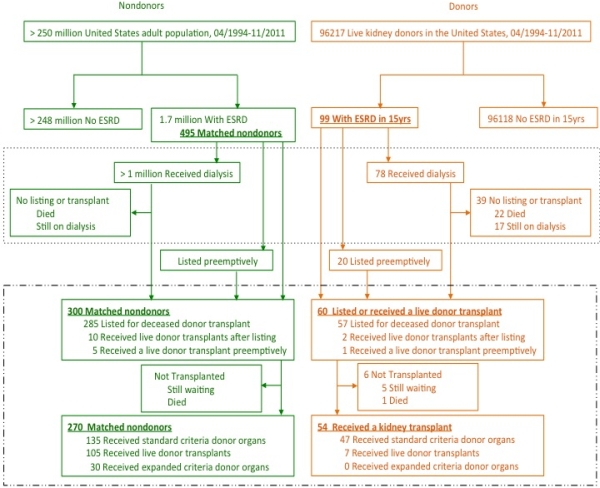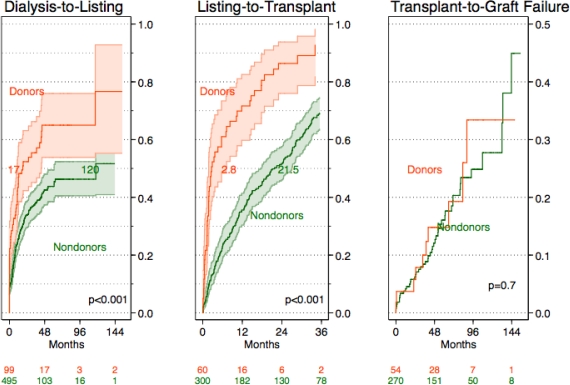Outcomes of Live Kidney Donors Who Develop End Stage Renal Disease
Johns Hopkins, Baltimore.
Meeting: 2015 American Transplant Congress
Abstract number: 467
Keywords: Donation, Graft failure, Kidney transplantation, Waiting lists
Session Information
Session Name: Concurrent Session: Kidney: Living Donor Issues III
Session Type: Concurrent Session
Date: Tuesday, May 5, 2015
Session Time: 4:00pm-5:30pm
 Presentation Time: 5:12pm-5:24pm
Presentation Time: 5:12pm-5:24pm
Location: Terrace I-III
Kidney donors can develop ESRD after donation, but the outcomes of those who do remain poorly characterized.
Methods: Using USRDS and SRTR data, we compared access to kidney transplantation (KT), time from ESRD to listing, time from listing to KT, and post-KT graft failure and death between donors and matched nondonors with ESRD.
Results: Among 99 individuals who donated a kidney between April 1994 and November 2011 and who developed ESRD, 78 initially received dialysis (of whom 37 listed for KT, 2 received live donor KT without listing, and 39 never listed for or received a KT), 20 listed preemptively (of whom 19 were subsequently transplanted), and 1 received a preemptive live donor KT without listing or ever receiving dialysis (Figure 1). Donors were listed earlier (median-time-to-listing 17 months versus 120 for nondonors; p<0.001), received KT earlier (median-waiting-time 2.8 months versus 21.5 for nondonors; p<0.001) (Figure 2), and received 13% live donor, 87% standard criteria, and 0% expanded criteria deceased donor KT (versus 39%, 50%, and 11% in nondonors). Post-KT graft (HR 1.1, p=0.7) and patient (HR 0.6, p=0.5) survival were comparable in donors and matched nondonors.


Conclusions: Live donors who developed ESRD were listed and transplanted faster than their matched nondonor counterparts, with equivalent post-transplant outcomes. However, our finding that 39% of donors who developed ESRD never listed for a transplant is tragic and strongly warrants improvements in access to transplantation for such donors.
To cite this abstract in AMA style:
Muzaale A, Massie A, Kucirka L, Segev D. Outcomes of Live Kidney Donors Who Develop End Stage Renal Disease [abstract]. Am J Transplant. 2015; 15 (suppl 3). https://atcmeetingabstracts.com/abstract/outcomes-of-live-kidney-donors-who-develop-end-stage-renal-disease/. Accessed February 16, 2026.« Back to 2015 American Transplant Congress
